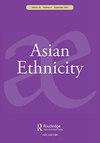韩国多元文化话语倡导团体的悖论配置
IF 0.8
Q3 ETHNIC STUDIES
引用次数: 0
摘要
摘要本文表明,韩国支持多元文化的群体的矛盾配置源于韩国独特的殖民主义、领土划分和现代化经历。与其他社会不同,保守派政治力量主张多元文化,并将其不容忍归咎于民族主义。另一方面,其政治对手一直徘徊在韩国民族主义上,这种民族主义往往被视为多元文化主义的反面。为了探究韩国多元文化主义形成这种格局的前因,我使用了傅的治理心态和谱系学理论概念。政府心态侧重于政策问题产生的条件或环境,谱系学使我们能够追溯其话语的起源,以消除和消除对韩国多元文化的普遍看法。本文探讨了历史和地缘政治条件如何影响与多元文化话语的接触,以及后民族主义的出现如何为多元文化政策奠定基础。本文章由计算机程序翻译,如有差异,请以英文原文为准。
Paradoxical configuration of advocacy groups for multiculturalism discourse in South Korea
ABSTRACT This article demonstrates that the paradoxical configuration of groups supporting multiculturalism in South Korea stems from uniquely Korean experiences of colonialism, territorial division, and modernization. Unlike other societies, conservative political force advocates for multiculturalism and blames nationalism for its intolerance. On the other hand, its political counterparts have lingered on Korean nationalism, often presented as an antipode of multiculturalism. For exploring the antecedents of South Korean multiculturalism that contributed to shaping such configuration, I use the Foucauldian theoretical concept of governmentality and genealogy. Governmentality focuses on the conditions or circumstances under which policy problems are produced and genealogy allows us to trace back to its origin of the discourse, for de-familiarizing and dismantling the widespread perception of South Korean multiculturalism. This article explores how historical and geopolitical conditions have shaped engagement with multiculturalism discourse and how the emergence of post-nationalism laid the foundation for multiculturalism policy.
求助全文
通过发布文献求助,成功后即可免费获取论文全文。
去求助
来源期刊

Asian Ethnicity
PHYSIOLOGY-
CiteScore
2.80
自引率
6.20%
发文量
27
期刊介绍:
In the twenty-first century ethnic issues have assumed importance in many parts of the world. Until recently, questions of Asian ethnicity and identity have been treated in a balkanized fashion, with anthropologists, economists, historians, political scientists, sociologists and others publishing their studies in single-discipline journals. Asian Ethnicity provides a cross-disciplinary, international venue for the publication of well-researched articles about ethnic groups and ethnic relations in the half of the world where questions of ethnicity now loom largest. Asian Ethnicity covers any time period, although the greatest focus is expected to be on the twentieth and twenty-first centuries.
 求助内容:
求助内容: 应助结果提醒方式:
应助结果提醒方式:


